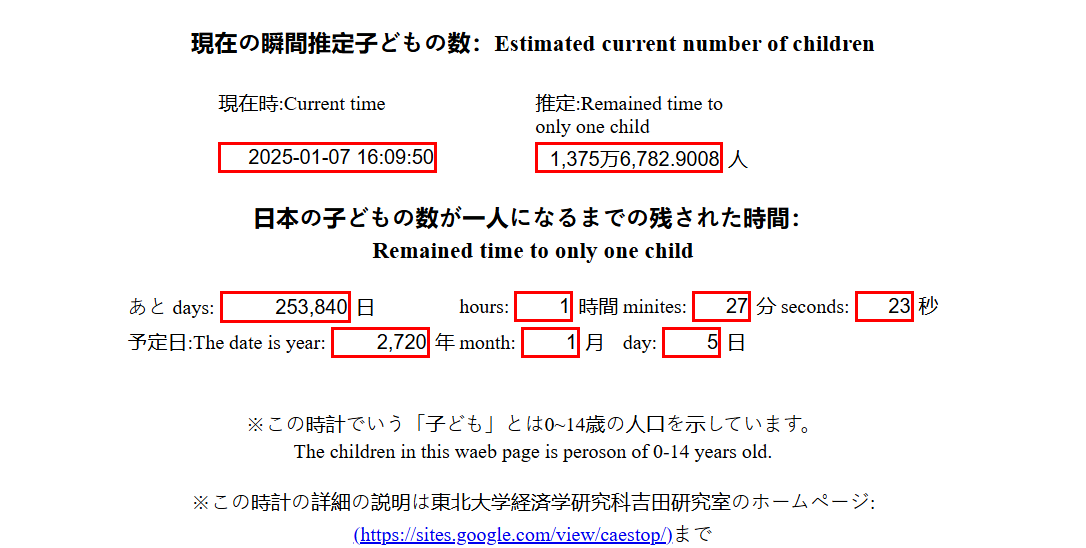Japanese expert reveals when the country will be left with just one child under 14
Hiroshi Yoshida has developed a clock that highlights Japan’s rapidly declining fertility rate
Your support helps us to tell the story
From reproductive rights to climate change to Big Tech, The Independent is on the ground when the story is developing. Whether it's investigating the financials of Elon Musk's pro-Trump PAC or producing our latest documentary, 'The A Word', which shines a light on the American women fighting for reproductive rights, we know how important it is to parse out the facts from the messaging.
At such a critical moment in US history, we need reporters on the ground. Your donation allows us to keep sending journalists to speak to both sides of the story.
The Independent is trusted by Americans across the entire political spectrum. And unlike many other quality news outlets, we choose not to lock Americans out of our reporting and analysis with paywalls. We believe quality journalism should be available to everyone, paid for by those who can afford it.
Your support makes all the difference.A Japanese expert on demographic trends and ageing society has warned that if the country’s birthrate continues its current decline, the nation will be left with only one child under the age of 14 by 5 January 2720.
Hiroshi Yoshida, a professor at Tohoku University’s Research Center for Aged Economy and Society, has been maintaining a conceptual clock that highlights Japan’s rapidly declining fertility rate by displaying real-time data on the number of children in the country.
It shows the number of children in the current year and the previous year and tracks the decrease every second.
Using official population data from the Japanese Statistics Bureau, the clock calculates a decreasing rate by comparing the number of children in consecutive years. The clock then estimates the year when the number of children will drop to just one, based on this steady decline.
According to the latest calculation, this would happen around the year 2720 – 695 years from now.
Mr Yoshida has been releasing estimates every year since April 2012, according to The Japan Times.
The forecast is derived from the annual rate of decline in the population of children. The latest data, reflecting a 2.3 per cent decrease, has advanced the predicted date by more than 100 years compared to the estimate made in 2023.
Japan’s birthrate dropped to a record low of 1.20 in 2023, with Tokyo’s rate falling below one. This decline has been linked to fewer marriages, with a growing number of people remaining single.
Meanwhile, the number of births in Japan during the first half of 2024 fell to its lowest level since 1969, according to government data. Between January and June last year, Japan recorded 350,074 births, a 5.7 per cent drop from the same period in 2023, the health ministry’s preliminary report revealed.
This decline continues a longstanding trend, with 2023 also marking the lowest annual number of births since records began in 1899.
The population survey report released on 30 August last year detailed that births had fallen by 5.7 per cent (20,978 fewer births) compared to 2023. In 2023, the number of births had already dropped by 3.6 per cent (13,890 fewer births) from the year prior.
Japanese policymakers are fighting tooth and nail to implement what they call “extraordinary measures to combat the declining birthrate”. Japanese leaders have called the country’s declining birth rate alarming.

Mr Yoshida mentions on his website that the aim of the real-time clock – which calculates and displays the year when the number of children in Japan would hypothetically reduce to just one based on the current rate of decline – is to raise awareness about Japan’s rapid population decline, particularly among children, and the broader implications of the country’s declining birthrate.
The Japanese government has been trying various measures to address this issue, including expanding childcare facilities, offering housing subsidies, and even launching a government-run dating app to encourage marriage and childbearing.
The app even caught billionaire Elon Musk’s interest who wrote on X: “I’m glad the government of Japan recognises the importance of this matter. If radical action isn’t taken, Japan (and many other countries) will disappear!”
“Marriage is a decision based on one’s own values, but the Tokyo Metropolitan Government is working to build momentum for marriage so that those who think they ‘intend to get married eventually’ can take that first step,” the dating app’s website said.
“We hope that every single one of you who wishes to get married will think about what being in a ‘couple’ means to you,” it said.
It also outlined other government measures to support couples, including providing information on work-life balance, childcare, housing assistance, men’s involvement in housework and child-rearing, and career counselling.
Despite government efforts, experts predict that Japan’s population decline will persist for decades due to the current demographic structure. Even if the fertility rate were to rise immediately, the population would continue to shrink until the imbalance between the younger and older generations stabilises.
The Independent has reached out to Tohoku University’s Research Center for Aged Economy and Society for more details.

Join our commenting forum
Join thought-provoking conversations, follow other Independent readers and see their replies
Comments